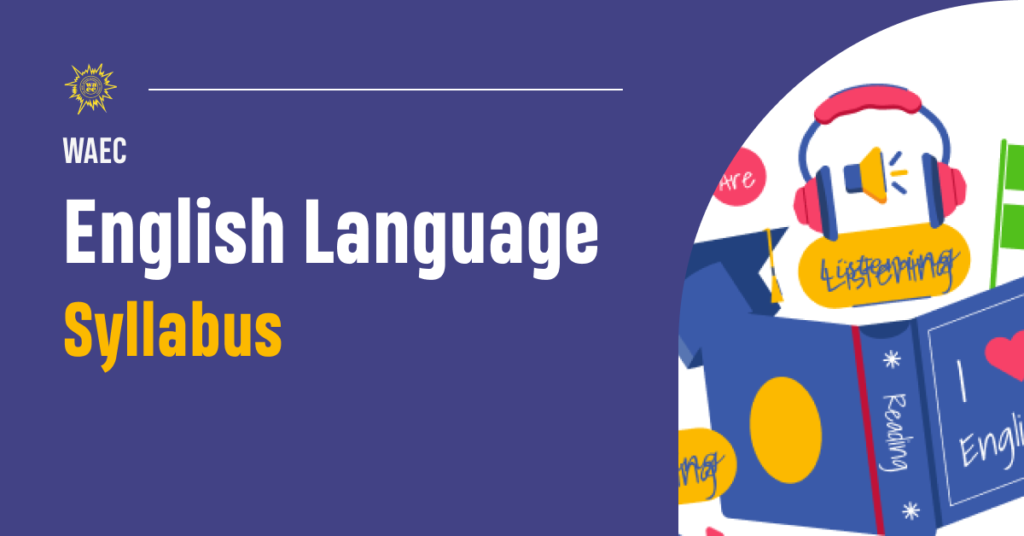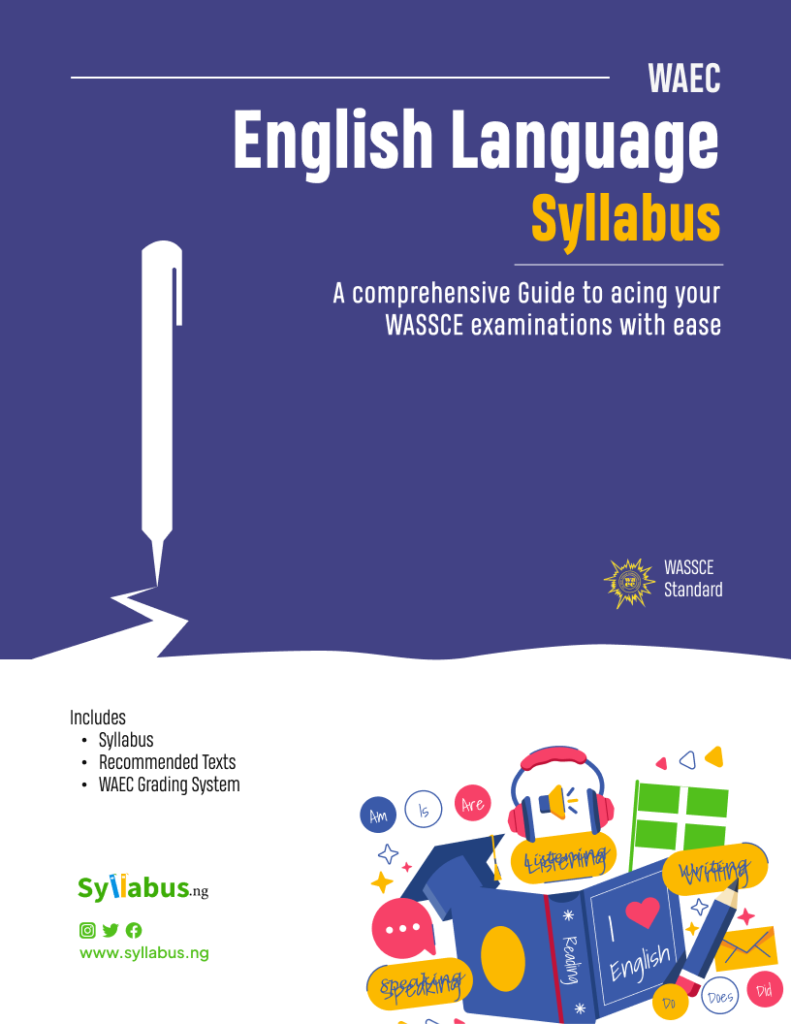Ace your WAEC English Language exam with ease! Download our comprehensive syllabus today and start your journey to success.

Home » WAEC Syllabus » WAEC English Language Syllabus
English Language is one of the four important subjects of the WAEC examinations and without a pass in it, you cannot gain admission in any university in Nigeria.
This exam will test your writing skills, your ability to use correct English and punctuate properly.
You will also be asked questions based on a comprehension passage where you may be asked the grammatical functions of some words.
You must study both your syllabus and past questions because you will learn a lot about the exams.
There will be three papers –
Papers 1, 2 and 3, all of which must be taken. Papers 1 and 2 will be a composite paper to be taken at one sitting.
PAPER 1 (For candidates in The Gambia, Nigeria, Sierra Leone and Liberia only): Will consist of eighty multiple choice questions; forty lexical and forty structural questions. Each question will have four options lettered A to D and should be answered within 1 hour for 40 marks.
PAPER 2 (For all candidates): Will consist of five essay topics and a passage each to test candidates’ comprehension and summary skills. Candidates will be expected to write an essay on one of the topics and answer all the questions on the comprehension and summary passages. The paper will last 2 hours and carry 100 marks
PAPER 3: Will consist of sixty multiple-choice items on the Test of Orals for candidates in Nigeria and Liberia and the Listening Comprehension Test for candidates in the Gambia and Sierra Leone. All the questions should be answered in 45 minutes for 30 marks.

Excelling your WAEC English Language exam starts from knowing what’s expected of you.
Don’t be left behind. Download the Syllabus today.
| WAEC ENGLISH SYLLABUS | ||
| PAPER 1: (For candidates in The Gambia, Nigeria, Sierra Leone and Liberia only) This is an objective/multiple choice paper comprising eighty questions: forty lexical and forty structural questions. Each question will have four options lettered A to D. | ||
| SN | TOPICS | OBJECTIVES |
| A | LEXIS | I.. (a) Building and Building Construction; (b) Agriculture; (c) Fishing; (d) Stock exchange; (e) Health; (f) Environment; (g) Culture, Institutions and Ceremonies; (h) Law and Order; (i) Motor Vehicles and Travelling; (j) Government and Administration; (k) Sports; (l) Religion; (m) Science and Technology; (n) Animal husbandry; (o) Advertising; (p) Human Internal Body system and function. II. Idioms, i.e. idiomatic expressions and collocations (e.g. ‘hook, line and sinker’, ‘every Tom, Dick and Harry” etc.) the total meaning of which cannot be arrived at simply by consideration of the dictionary meanings of the words in the structures in which they appear. III. Structural elements of English e.g. sequence of tenses, matching of pronouns with their antecedents, correct use of prepositions etc. IV. Figurative Usage |
| B | STRUCTURE | Structure here includes: (i) The patterns of changes in word-forms which indicate number, tense, degree, etc; (ii) The patterns in which different categories of words regularly combine to form groups and these groups in turn combine to form sentences; (iii) The use of structural words e.g. conjunctions, determiners, prepositions, etc. |
| PAPER 2: (For all candidates) The paper will be divided into three sections: Sections A, B and C. Candidates will be required to spend 2 hours on this paper. | ||
| A | ESSAY WRITING | The topics will demand the following kinds of writing: (i) letter; (ii) speech; (iii) narration; (iv) description; (v) argument/debate; (vi) report; (vii) article; (viii) exposition; (ix) creative writing. Marks will be awarded for: (i) Content: relevance of ideas to the topic; (ii) Organization: formal features (where applicable), good paragraphing, appropriate emphasis and arrangement of ideas; (iii) Expression: effective control of vocabulary and sentence structure; (iv) Mechanical Accuracy: correct grammar, punctuation, spelling etc. The minimum length will be 450 words. |
| B | COMPREHENSION | The questions will test candidates’ ability to (i) find appropriate equivalents for selected words or phrases; (ii) understand the factual content; (iii) make inferences from the content of the passage; (iv) understand the use of English expressions that reveal/reflect sentiments/emotions/attitudes; (v) identify and label basic grammatical structures, words, phrases or clauses and explain their functions as they appear in the context; (vi) identify and explain basic literary terms and expressions; (vii) recast phrases or sentences into grammatical alternatives. The passage will be chosen from a wide variety of sources all of which should be suitable for this level of examination in terms of theme and interest. The passage will be written in modern English that should be within the experience of candidates. The comprehension test will include at least four questions based on (ii) above. |
| C | SUMMARY | Candidates will be required to spend 40 minutes on this section. The section will consist of one prose passage of about five hundred (500) words and will test candidates’ ability to (i) extract relevant information; (ii) summarize the points demanded in clear concise English, avoiding repetition and redundancy; (iii) present a summary of specific aspects or portions of the passage. The passage will be selected from a wide variety of suitable sources, including excerpts from narratives, dialogues and expositions of social, cultural, economic and political issues in any part of the world. |
| PAPER 3: Oral English | ||
| A | TEST OF ORALS | The test will also be of the multiple-choice objective type consisting of sixty questions on a wide range of areas or aspects of Orals as contained in the syllabus. The test will cover the following areas: 1. Vowels – pure vowels and diphthongs; 2. Consonants and clusters; 3. Rhymes; 4. Word stress/Syllable Structure; 5. Emphatic Stress/Intonation Patterns; 6. Phonetic Symbols |
The WAEC English exam is divided into 3 papers. Papers 1 and 3 will be multiple choice questions and you will be given a total of 140 questions; 80 questions in paper 1 and 60 in paper 3
In paper 2, you will be given a list of topics to write on and a comprehension passage to answer.
Stay calm and pay attention to the instructions. Do not panic whenever you see a question you don’t know. When you get confused about a question, raise your hand and ask the invigilator for clarifications.
Draw up a reading timetable for all the subjects you will be taking in the WAEC exams.
Yes, if any candidate is caught cheating in the exam he or she will be punished for examination malpractice. Leading to cancellation or withholding of the result.
You must have at least credits in your five (5) core subjects to gain admission into any university including Mathematics and English Language.
School candidates are to collect their certificate from the school where they write the exam.
Private candidates are to obtain their certificates from WAEC directly.
All the topics in the syllabus above are important and you will be tested on them.

Excelling your WAEC English Language exam starts from knowing what’s expected of you.
Don’t be left behind. Download the Syllabus today.